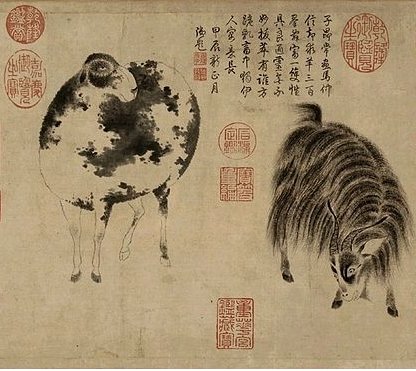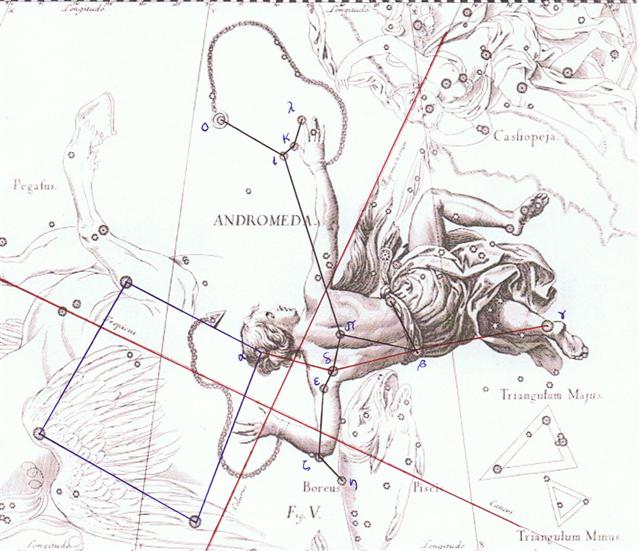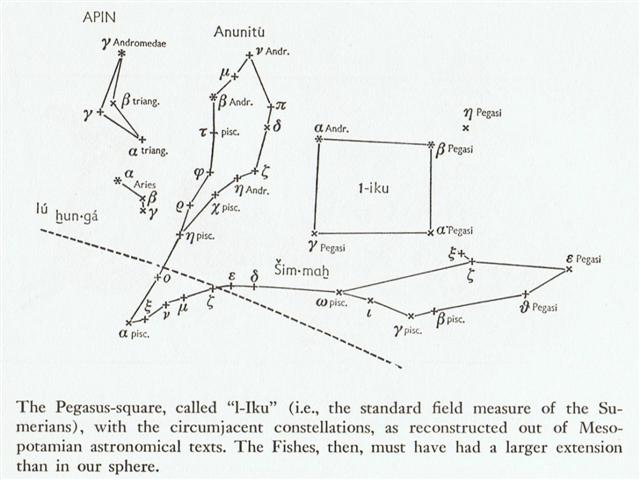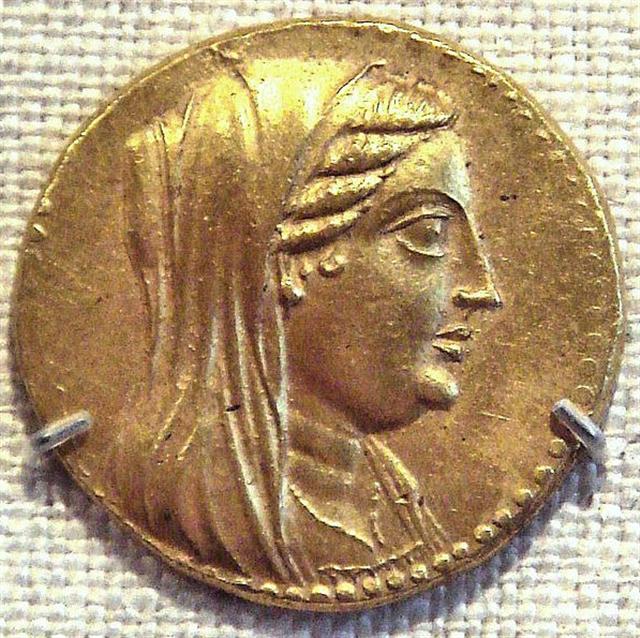11-5. When June 1 was visible close
to the nakshatra Full Moon
something new would begin.
|
1 |
 |
7 |
 |
13 |
 |
19 |
 |
|
2 |
 |
8 |
 |
14 |
 |
20 |
 |
|
3 |
 |
9 |
 |
15 |
 |
21 |
 |
|
4 |
 |
10 |
 |
16 |
 |
22 |
 |
|
5 |
 |
11 |
 |
17 |
 |
23 |
 |
|
6 |
 |
12 |
 |
18 |
 |
24 |
 |
... On the twenty-fifth day of the first
month (Vaitu Nui), Ira and Makoi set
sail; on the first day of June ('Maro'), the bow of
Ira's canoe appeared on the distant horizon, came
closer and closer on its course, and sailed along, and
finally (one) could see the (new home) land ... [E:17]
|
Nov 25 |
26
(*250) |
27 |
28 |
29 |
30 |
Dec 1
(335) |
|
EQUINOX |
SEPT
23 |
24 |
25 |
26 |
27 |
28 |
|
 |
 |
 |
 |
 |
 |
 |
|
Eb2-8 |
Eb2-9 |
Eb2-10 |
Eb2-11 |
Eb2-12 (54) |
Eb2-13 |
Eb2-14 |
|
a matiro - ko hiti |
noho maitaki |
koira taua |
ko pe ko tae |
te rima |
tagata oho - ki moto vaero tae |
kiore - o te henua |
|
Tiro.
Mgv.: Spots on linen. Ta.:
tiro, to mark. Mq.: tiotioa,
blotched, covered with white spots.
Titiro, to admire. P Ma.: tiro,
to gaze at. Churchill. Vi.: tiro,
siro, sisiro, to descend,
to go down a steep or hill. Churchill 2.
Hiti. 1. To show
itself again, to reappear (of the new
moon, of a constellation - meaning
uncertain). 2. Said of thin,
tough-fleshed fish of indifferent taste:
ika hiti. 3. Said of fish when
they come to the stones of the shore for
insects among the seaweed: he hiti te
ika. 4. To reproach someone for his
ingratitude. Vanaga. 1. To rise, to
appear, to dawn; hitihaga,
rising; hitihaga roa, sunrise;
hitihiti, to dawn; horau hitihiti,
break of day; hakahiti ki te eeve,
to show the buttocks. 2. Puffed; gutu
hiti, thick lips. Churchill.
Pe.
1. Like, as. PS Mgv.:
pe, as, the same as, also.
Sa.:
pei, like, as. Niuē:
pehe,
thus. 2. And, also (in numerals);
e rua
te hagahuru pe aha,
twenty-four. PS Sa.:
pe,
a restrictive particle in counting,
only. To.:
be,
only. Uvea:
pe,
id. Churchill.
Pau.:
Spoilt, damaged. Mgv.:
pee,
macerated, spoilt. Ta.:
pe,
spoilt, rotten. Mq.:
pe,
id. Sa.:
pe,
id. Ma.:
pe,
pulpy, purulent. Churchill.
Tae. 1. Negation
used in conditional and temporal
clauses: ana ta'e hoa te ûa, ina he
vai, when it does not rain, there is
no water. Also used with some verbal
forms such as: o te aha koe
i-ta'e-oho mai-ai? why didn't you
come? Otherwise its use is limited to
adjectives or verbal adjectives:
tagata ta'e hupehupe, person who is
not weak, hard worker; nohoga ta'e
oti, endless existence, eternity. 2.
Interjection expressing admiration,
always used with he: ta'e he
tagata! what a man! Ta'e he aga!
what a great job! Ta'e he tagata
koe mo keukeu i te henua! what a
good farmer you are! Vanaga. 1.
Prepositive negative: without, not,
none. PS To.: tae, prepositive
negative. 2. To remain; tae atu ki,
as far as, until. Taehaga (tae
1), to shake the head in sign of
negation, reluctant, to disdain, to be
displeased. 3. Pau.: tae, to
arrive. Mgv.: tae, id. Ta.:
tae, id. Ma.: tae, id. 4.
Pau.: taetae, elephantiasis in
scroto. Ta.: taetae, ill,
illness. Churchill. |
|
Al Kalb-16 (The Heart)
/
Jyeshtha-18 (Eldest) /
ANA-MUA-1
(Entrance pillar)
ANTARES = α Scorpii
(249.1),
MARFIK (Elbow) = λ Ophiuchi,
φ Ophiuchi (249.5), ω Ophiuchi (249.8) |
γ Apodis (250.1), σ Herculis (250.3), θ
Tr. Austr. (250.6), τ Scorpii (250.7) |
HAN = ζ Ophiuchi
(251.0) |
ζ
Herculis,
η
Tr. Austr.
(252.1), η Herculis, β Apodis (252.5) |
ATRIA = α Tr. Austr.
(253.9) |
Tail-6 (Tiger)
WEI (Tail) = ε Scorpii,
η Arae (254.3),
DENEBAKRAB = μ Scorpii
(254.7) |
ι Ophiuchi (255.3),
GRAFIAS = ζ Scorpii (255.4)
*214.0 = *255.4 - *41.4 |
|
VISIBLE CLOSE TO THE FULL MOON: |
|
No star listed (66) |
No star listed (67) |
Rohini-4 (The Red One)
/
Pidnu-sha-Shame-4
(Furrow of Heaven)
/
ANA-MURI-2 (Rear pillar - at the foot of
which was the place for tattooing)
ALDEBARAN = α Tauri
(68.2),
THEEMIN = υ² Eridani
(68.5) |
No star listed (69) |
No star listed (70) |
TABIT =
π³
Orionis
(71.7),
π²
Orionis (71.9) |
π4
Orionis (72.1),
ο¹
Orionis (72.4),
π5
Orionis (72.8)
*31.0 = *72.4 - *41.4 |
|
May 26 |
27 |
28 |
29 |
30 |
31 |
June
1 (152) |
|
MARCH
23 |
24 |
EQUINOX |
26 |
27 |
28 |
29
(88) |
On the bottom side of the Phaistos disc we have found
a kind of axe at this
place, viz. in place 29 as counted up from the
perimeter, or in place 118 - 29 = 89 as counted down
from the central top in day 161:
|
37 |
2 |
9 |
14 |
 |
 |
 |
|
107
→ 73 + 34 |
108 |
109
→ 394 - 285 |
|
→
394
(Jan 29, *314) |
|
Ea8-2--4: |
|
*312 |
*313 |
*314 → 285 + 29 |
|
Jan
27
(392) |
28 |
29 (121 + 3 * 91) |
|
28 |
35 |
88 |
19 |
|
battle axe |
breast |
|
 |
 |
|
152
→ 394 - 242 |
241
→ 80 + 161 |
|
*357 → 200 + 314 / 2 |
*446 → 366 + 80 |
|
March
13 (72) |
June 10 (*81) |
March 13 (72) + 16 = 88 (MARCH 29).
|
July 24 |
25 |
26 |
27 (208 → 256 - 48) |
 |
 |
 |
 |
|
Ea7-36 |
Ea7-37 |
Ea7-38 |
Ea7-39 (256 → 4 *
64) |
|
ka rere - i te hatu hoi |
ki te manu ariga ruku
hia |
te tamaiti |
te raa - te ragi |
|
Ariga. Face, cheek. 1.
Ariga ora, (lit. 'living face')
keepsake, memento, memory, souvenir
(of someone). This used to be the
name given the moai (stone
statues) carved as memories of the
dead. 2. Ariga ora is also
used in the generic sense of a
memento, a keepsake: he mate te
matu'a he ato tepoki i te rîu o
toona matu'a; he-ariga ora o toona
matu'a [when] the father dies,
[and] the son sings a riu for
his father, this constitutes an
ariga ora of his father. Vanaga.
Face, aspect, expression, mien,
visage, stature, superficies. T Ma.:
aria, to resemble.
Hakaariga, to encroach.
Churchill. Ariari, sharp, the
edge of a sword. Ta.: ariari,
transparence, brightness. Ha.:
aliali, white. Churchill.
Ruku.
(Also rukuruku):
To dive; to fish underwater; diving;
i-turu-era au ki tai, he-ûi koai
te tagata era, e-ruku-mai-era i te
îka, i te ura, as I went down to
the sea, I saw who those people
were, who were fishing underwater
for fish and lobsters. Vanaga. To
bathe, to immerse, to swim face
down, to dive, to leap into the
water from a height. Hakaruku,
to cover with water, to immerse, to
submerge, to moisten, to wash, to
drink. P Mgv.: ruku, to dive,
to plunge. Mq.: úku, to dive,
to immerse. Churchill. |
|
REVERSED NAKSHATRA → CLOSE TO THE
FULL MOON: |
|
GREDI (Goat) =
α
Capricorni
(307.2),
σ
Capricorni (307.5),
ALSHAT (The Sheep) =
ν
Capricorni
(307.9) |
Al Sa’d al
Dhabih-20 (Lucky One of the
Slaughterers)
/
Ox / Heard Boy
(Buffalo)
DABIH =
β
Capricorni
(308.0),
κ
Sagittarii (308.1),
SADIR (Hen's Breast) =
γ
Cygni (308.4),
PEACOCK =
α
Pavonis
(308.7)
*267.0 = *308.4 - *41.4 |
KHUFU
OKUL =
π
Capricorni
(309.6),
BOS =
ρ
Capricorni
(309.9)
ARNEB (α Leporis)
MINTAKA (δ Orionis) |
KHAFRE
ο
Capricorni (310.2),
θ
Cephei (310.5)
HEKA (λ
Orionis)
ALNILAM (ε
Orionis) |
|
Jan 22 |
23 |
24 |
25 |
|
"Dec 12 |
13 |
14 |
15 (349) |
|
NOV 19 |
20 |
21 |
22 (*246) → 2 * 123 |
 |
|
INVISIBLY CLOSE TO THE SUN: |
|
χ
Cancri (125.2),
BRIGHT FIRE =
λ
Cancri (125.4)
*84.0 = *125.4 - *41.4 |
AVIOR =
ε
Carinae (126.4),
φ
Cancri (126.8)
*85.0 = *126.4 - *41.4 |
Ο Ursae Majoris (127.4)
*86.0 = *127.4 - *41.4 |
Pushya-8
(Nourisher)
υ Cancri (128.1),
θ
Cancri (128.2) |
|
July 28 |
29 (210 → 420 / 2) |
30 |
31 (260 - 48) |
 |
 |
 |
 |
|
Ea8-1 |
Ea8-2 |
Ea8-3 |
Ea8-4 (260) |
|
E tamaiti |
ki te raa - te henua |
tagata haga |
ko te rima |
|
REVERSED NAKSHATRA → CLOSE TO THE
FULL MOON: |
|
MENKAURE
ROTTEN MELON =
ε
Delphini,
φ
Pavonis (311.2),
η
Delphini (311.4),
ζ
Delphini,
ρ
Pavonis (311.7)
PHAKT (α
Columbae)
ALNILAK (ζ Orionis)
*270.0 = *311.4 - *41.4 |
ROTANEV = β Delphini,
ι Delphini (312.3), τ Capricorni (312.6), κ Delphini (312.7),
SVALOCIN = α Delphini,
υ Capricorni, υ Pavonis (312.8) |
μ²,
μ¹
Oct. (313.2),
DENEB CYGNI (Tail of the Swan) =
α
Cygni
(313.5),
β
Pavonis (313.6),
δ
Delphini (313.8) |
Al Sa’d al Bula'-21 (Good Fortune of the Swallower)
/
Dhanishta-24 (Most Famous)
/
Girl-10 (Bat)
YUE (Battle-Axe) =
ψ
Capricorni
(314.3),
GIENAH
CYGNI = ε
Cygni,
η
Cephei (314.5),
γ
Delphini (314.6),
σ
Pavonis (314.7),
ALBALI = ε
Aquarii
(314.8)
BETELGEUZE (α Orionis) |
|
Jan 26 |
27 (208 + 184 = 392) |
28 |
29 (121 + 3 * 91) |
 |
|
INVISIBLY CLOSE TO THE SUN: |
|
Āshleshā-9 (Embrace)
/
Willow-24 (Stag)
π¹
Ursa Majoris,
δ
HYDRAE (129.6),
AL
MINHAR AL SHUJĀ
= σ
Hydrae, MUSEIDA =
π²
Ursae Majoris
(129.9)
RAS
ALHAGUE (α Ophiuchi) |
Al Nathrah-6 (Gap)
BEEHIVE (Exhalation of Piled-up Corpses) = ε Cancri,
η Pyxidis (130.4), XESTUS = ο Velorum
(130.5), ζ Pyxidis (130.7),
ASCELLUS BOREALIS =
γ Cancri, β Pyxidis (130.9)
*89.0 = *130.4 - *41.4 |
Extended Net-26a (Ox)
/
Arkū-sha-nangaru-sha-shūtu-12
(Southeast Star in the Crab)
η
Hydrae (131.0),
ASCELLUS AUSTRALIS =
δ
Cancri
(131.4),
KOO
SHE =
Bow and Arrow
= δ
Velorum
(131.6),
α
Pyxidis (131.8),
ε
Hydrae (131.9)
*90.0 = *131.4 - *41.4 |
ι Cancri (132.0),
ρ Hydrae (132.4)
*91.0 = *132.4 - *41.4 |
... In China, with Capricornus, Pisces,
and a part of Sagittarius, it [Aquarius] constituted the
early Serpent, or Turtle, Tien Yuen; and later was
known as Hiuen Ying, the Dark Warrior and Hero, or
Darkly Flourishing One, the Hiuen Wu, or Hiuen
Heaou, of the Han dynasty,
which Dupuis gave as Hiven Mao. It was a symbol of
the emperor Tchoun Hin, in whose reign was a great
deluge; but after the Jesuits came in it became Paou Ping,
the Precious Vase. It contained three of the sieu, and
headed the list of zodiac signs as the Rat, which in
the far East was the ideograph for 'water', and still so
remains in the almanacs of Central Asia, Cochin China, and
Japan ...
Counting from March 29 (88)
where the Sun rose at the Breast of Cassiopeia to right
ascension day *88 where the Sun rose at Betelgeuze there
were 80 days. The Breast of Cassiopeia would in principle
return to visibility 16 days after day 88, viz. in day 104,
and 80 days later, in day 184, Betelgeuze would in principle return to
visibility after its close encounter with the Sun:
|
Betelgeuze (*88) |
Day of
culmination |
138 |
(80 + RA / 24h *
365¼) |
225 |
|
Jan 29 (121 + 3 *
91) |
June 17 (168 → 88
+ 80) |
|
365 days = 20
weeks + 15 * 15 days |
|
Thuban (*212) |
Day of
culmination |
133 |
(80 + RA / 24h *
365¼) |
230 |
|
June 7 (168 - 10) |
Oct 19 (292) |
|
135 + 230 = 365
days |
|
Zuben Elgenubi
(*224) |
Day of
culmination |
135 |
(80 + RA / 24h *
365¼) |
228 |
|
June 17 (168 →
204 - 36) |
Oct 31 (304) |
|
137 + 228 = 365
days |
|
Ras Algethi
(*260) |
Day of
culmination |
135 |
(80 + RA / 24h *
365¼) |
228 |
|
July 23 (204
→ 158 +
46) |
Dec 6 (340 → 292
+ 48) |
|
137 + 228 = 365
days |
|
Schedir (*8) |
Day of
culmination |
|
(80 + RA / 24h *
365¼) |
233 |
| Nov 18
(322) |
March 29 (88) |
|
132 + 233 = 365
days |
When Betelgeuze rose with the Sun in June 17 this did not mean
it returned to visibility 16 days after June 1. Instead we
should count 168 (June 17) + 16 = 184 (July 3)
→ 123 (May 3) + 61.
And we could imagine that the counting here should be done
from FEBRUARY
1, i.e. according to the era of the Girdle of Andromeda.

Once upon a time I decided to count according to how
precession had changed the star positions since Roman
times (*27), according to Bharani (*41), and according to the Golden Age
of the Bull (*64). I had hesitated at *16 but then decided
to rule it out - it would become too complicated because *16
ought to associate to those 16 days before late at night a
star would return to visibility after its close encounter with
the rays from the rising Sun.
|
April 5 (460) |
6 (144 - 48 = 96) |
7 |
8 |
9 (99, 464) |
10 (100) |
|
JAN 31 |
FEBR 1 (32) |
2 |
3 |
4 |
5 |
 |
 |
 |
 |
 |
 |
|
Ea5-7 (140 + 3) |
Ea5-8 (12 * 12) |
Ea5-9 |
Ea5-10 |
Ea5-11 |
Ea5-12 (138 + 10) |
|
koia ra kua hanaga hia |
koia ra kua hanaga hia |
te tagata |
te hau tea |
koia ra |
te henua |
|
INVISIBLY
CLOSE TO THE SUN: |
|
1h (15.2)
β Phoenicis (15.1), υ Phoenicis, ι Tucanae
(15.6), η Ceti, ζ Phoenicis (15.7) |
Al Batn Al Hūt-26 (Belly of the Fish)
/
Revati-28 (Prosperous)
/
1-iku
(Field Measure)
MIRACH (Girdle) =
β
Andromedae,
KEUN MAN MUN (Camp's South Gate) =
φ
Andromedae
(16.0),
ANUNITUM =
τ
Piscium
(16.5),
REVATI (Abundant) =
ζ
Piscium
(16.9)
REGULUS
(α Leonis) |
ν Phoenicis (17.4),
κ Tucanae (17.6)
*159.0 + *182.0 = 341.0 |
No star listed (18) |
ADHIL
(Garment's Train) = ξ Andromedae
(19.3),
θ
Ceti (19.7) |
KSORA (Knee) =
δ
Cassiopeiae
(20.1),
ω
Andromedae (20.6),
γ
Phoenicis (20.8) |
 |
|
VISIBLE CLOSE
TO THE FULL MOON: |
|
13h (197.8)
ξ¹ Centauri (197.1), ξ² Centauri (197.9) |
APAMI-ATSA (Child of Waters) =
θ
Virginis,
ψ
Hydrae (198.5),
DIADEM =
α
Com. Ber.
(198.9) |
AL DAFĪRAH (Tuft) =
β
Com. Ber.
(199.4)
*158.0 = *199.4 - *41.4 |
σ Virginis (200.4)
*159.0 = *200.4 - *41.4 |
γ
Hydrae (201.0),
ι
Centauri (201.4)
*160.0 = *201.4 - *41.4 |
Al Simāk-12 (Lofty)
/
Chitra-14 (Bright One)
/
Horn-1 (Crocodile)
/
Sa-Sha-Shirū-19 (Virgin's Girdle)
/
ANA-ROTO-3 (Middle pillar)
MIZAR =
ζ
Ursae Majoris (202.4),
SPICA = α Virginis,
ALCOR (The Fox) = 80 Ursae
Majoris
(202.7)
SADALMELIK (α Aquarii) |
|
... It
inaugurates the most accurate solar calendar
known to the ancient world, with 365¼ days per
year. It declares the deceased princess
Berenike a goddess and creates a cult for
her, with women, men, ceremonies, and special
'bread-cakes'. Lastly it orders the decree to be
incised in stone or bronze in both hieroglyphs
and Greek, and to be publicly displayed in the
temples. The traditional Egyptian calendar had
365 days: twelve months of thirty days each and
an additional five epagomenal days. According to
the reform, the 5-day 'Opening of the Year'
ceremonies would include an additional 6th day
every fourth year. The reason given was that
the rise of Sothis advances to another day in
every 4 years, so that attaching the
beginning of the year to the heliacal rising of
the star Sirius would keep the calendar
synchronized with the seasons. This Ptolemaic
calendar reform failed, but was finally
officially implemented in Egypt by Augustus in
26/25 BCE, now called the Alexandrian calendar,
with a sixth epagomenal day occurring for the
first time on 29 August 22 BCE. Julius Caesar
had earlier implemented a 365¼ day year in Rome
in 45 BCE as part of the Julian calendar ...
 |
|
Oct 4 (277) |
5 |
6 |
7 |
8 |
9 (465 - 183) |
|
AUG 1 |
2 (214) |
3 |
4 |
5 |
6 |
Notably the Girdle of Virgo (Sa-Sha-Shirū-19) was
half a year away (→
186 = 6 * 31 right ascension days) from the Girdle of Andromeda at
1-iku. And the culmination (at 21h) of the Little
King (Regulus) was half a year away from the
culmination (at 21h) of the Lucky King (Sadalmelik).

|
























